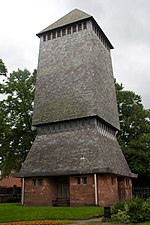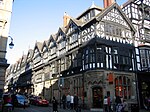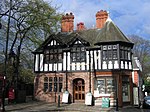The Chester Grosvenor Hotel
Buildings and structures in ChesterEngvarB from April 2014Grade II listed buildings in ChesterGrade II listed hotelsHotels in Cheshire ... and 2 more
Michelin Guide starred restaurants in the United KingdomRestaurants in Cheshire

The Chester Grosvenor Hotel is a hotel in Chester, Cheshire, England. The Grade II listed building was built between 1863 and 1865 and is owned by the Duke of Westminster. The long-standing establishment features an on-site restaurant that was previously awarded a Michelin star since 1990, however the restaurant failed to retain its Michelin Star in 2022's Michelin Guide following an extended period of closure due to COVID-19. The restaurant has since reopened, and is in the process of being assessed for the absent Michelin Star. The hotel is now operated by Bespoke Hotels.
Excerpt from the Wikipedia article The Chester Grosvenor Hotel (License: CC BY-SA 3.0, Authors, Images).The Chester Grosvenor Hotel
Eastgate Street, Chester Newtown
Geographical coordinates (GPS) Address Nearby Places Show on map
Geographical coordinates (GPS)
| Latitude | Longitude |
|---|---|
| N 53.190863888889 ° | E -2.8884194444444 ° |
Address
Lloyds Bank
Eastgate Street
CH1 1LR Chester, Newtown
England, United Kingdom
Open on Google Maps











